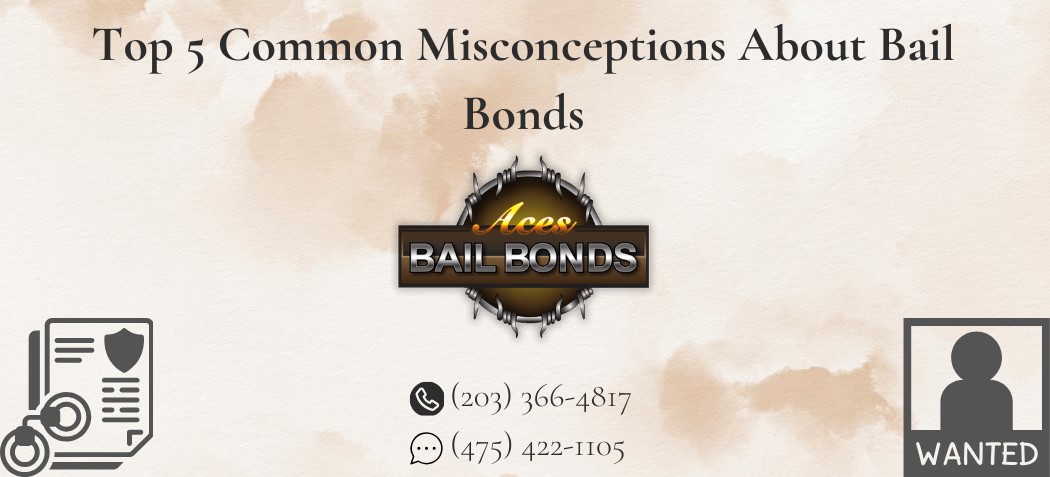Bail bonds are a crucial component of the criminal justice system, allowing individuals accused of crimes to be released from custody while awaiting trial. However, despite their importance, many misconceptions surround bail bonds, leading to confusion and misunderstandings. In this blog, we will explore the top five common misconceptions about bail bonds, providing clarity and insight into this often misunderstood aspect of the legal system.

1. Misconception: Bail Bonds Are Only for the Wealthy
One of the most pervasive misconceptions about bail bonds is that they are only accessible to the wealthy. This belief stems from high-profile cases where celebrities or affluent individuals post large bail amounts to secure their release. However, the reality is that bail bonds are designed to be accessible to people from all financial backgrounds.
The Truth
Bail bond agencies, such as Aces Bail Bonds, exist to help individuals who cannot afford to pay the full bail amount set by the court. These agencies charge a non-refundable fee, typically a percentage of the total bail amount (usually around 10%). This fee allows the accused to be released from custody without having to come up with the entire bail amount. Additionally, many bail bond agencies offer payment plans and other financial arrangements to make their services more affordable.
2. Misconception: Bail Bondsmen Are Bounty Hunters
Another common misconception is that bail bondsmen and bounty hunters are the same. While both roles exist within the bail system, they serve distinct and separate functions. This confusion is often perpetuated by popular media, which frequently depicts bail bondsmen as bounty hunters chasing down fugitives.
The Truth
Bail bondsmen are licensed professionals who provide the service of posting bail for individuals who cannot afford to pay the full amount themselves. Their primary role is to ensure that their clients attend all required court appearances. If a client fails to appear in court, the bail bondsman is responsible for paying the full bail amount to the court.
On the other hand, bounty hunters, also known as bail enforcement agents, are hired by bail bondsmen to locate and apprehend individuals who have skipped bail. Bounty hunters have specialized training and legal authority to capture and return fugitives to the custody of the court. While some bail bondsmen may also be licensed as bounty hunters, the two roles are distinct.
Yasmeen Khan of Aces Bail Bonds, for example, collaborates closely with licensed bail enforcement agent George Shimakonis. Yasmeen focuses on the business and client management aspects of the bail bond agency, while George specializes in the enforcement and apprehension of fugitives. This collaboration ensures that clients are treated fairly and that the legal process is upheld.
3. Misconception: Bail Bonds Are Only Used for Serious Crimes
There is a widespread belief that bail bonds are only necessary for individuals accused of serious crimes, such as felonies. This misconception arises from the assumption that only high-stakes cases require bail to ensure the defendant’s appearance in court. However, bail bonds are utilized for a wide range of offenses, from minor misdemeanors to serious felonies.
The Truth
Bail is a legal mechanism used to secure the release of an accused individual from custody, regardless of the severity of the crime. Courts set bail amounts based on several factors, including the nature of the offense, the defendant’s criminal history, and the likelihood of the defendant appearing in court.
For minor offenses, such as traffic violations or petty theft, the bail amount may be relatively low. Even in these cases, individuals may still require the services of a bail bond agency if they cannot afford to pay the full bail amount. Conversely, for more serious crimes, the bail amount may be higher, necessitating the use of a bail bond to secure release.
Aces Bail Bonds provides services for a variety of offenses, ensuring that individuals accused of both minor and serious crimes have the opportunity to be released from custody while awaiting trial. This approach helps maintain the presumption of innocence and allows defendants to better prepare for their legal defense.
4. Misconception: Bail Bond Agencies Only Care About Money
Another common misconception is that bail bond agencies are solely focused on making money and do not care about their client’s well-being. This perception is fueled by negative stereotypes and misunderstandings about the nature of the bail bond industry. While it is true that bail bond agencies are businesses, many are deeply committed to supporting their clients and ensuring their legal rights are protected.
The Truth
Reputable bail bond agencies prioritize their client’s needs and work to provide compassionate, professional service. They understand the stress and uncertainty that come with being arrested and work to alleviate some of the burdens associated with the bail process.
For instance, Yasmeen Khan, the owner of Aces Bail Bonds, has been dedicated to the bail bonds industry since 2010. Her extensive experience and commitment to her clients are evident in her hands-on approach and personalized service. Yasmeen collaborates with her clients to develop payment plans, provide legal resources, and offer guidance throughout the bail process.
Furthermore, many bail bond agencies operate with a strong sense of community and public service. They recognize that their role is not only to post bail but also to ensure that their clients have the support and resources they need to navigate the legal system successfully. By building trust and fostering positive relationships with their clients, these agencies contribute to a fairer and more equitable justice system.
5. Misconception: Posting Bail Guarantees Freedom Until Trial
A significant misconception is that once bail is posted, the accused is guaranteed freedom until their trial date. While posting bail does secure temporary release from custody, it comes with specific conditions that must be adhered to. Failure to comply with these conditions can result in re-arrest and the forfeiture of bail.
The Truth
When a court sets bail, it often imposes conditions that the defendant must follow while out on bail. These conditions can include travel restrictions, regular check-ins with a bail bondsman or pretrial services officer, drug testing, and other requirements designed to ensure the defendant’s compliance with the legal process.
If a defendant violates any of these conditions or fails to appear for their court date, the court may revoke bail and issue a warrant for the defendant’s arrest. In such cases, the bail bondsman is responsible for locating and returning the defendant to custody. Additionally, the bail amount posted by the bail bondsman may be forfeited to the court, resulting in financial loss for the bail bond agency.
Aces Bail Bonds emphasizes the importance of understanding and adhering to all bail conditions. Yasmeen Khan and her team work closely with clients to ensure they are aware of their obligations and provide ongoing support to help them stay compliant. This proactive approach helps minimize the risk of bail violations and promotes a successful outcome for the defendant.
Conclusion
Understanding the realities of the bail bond process is crucial for anyone navigating the criminal justice system. By dispelling these common misconceptions, we can foster a more informed and compassionate perspective on bail bonds and the vital role they play in ensuring justice and fairness.
Bail bonds are not just for the wealthy or serious crimes; they are a tool designed to help individuals from all walks of life secure their release and prepare for their legal proceedings. Bail bondsmen and bounty hunters, while both essential to the system, serve different functions and should not be conflated. Reputable bail bond agencies care deeply about their clients and strive to provide support and guidance throughout the bail process. Lastly, posting bail is not a guarantee of freedom without conditions; compliance with court-imposed requirements is essential to maintaining bail status.
By educating ourselves and others about these misconceptions, we can better appreciate the complexities of the bail bond system and advocate for reforms that promote fairness and justice for all.

